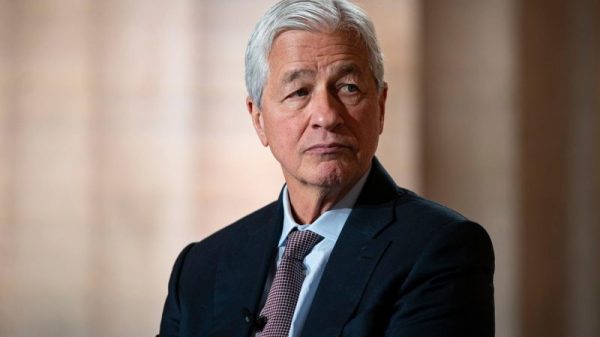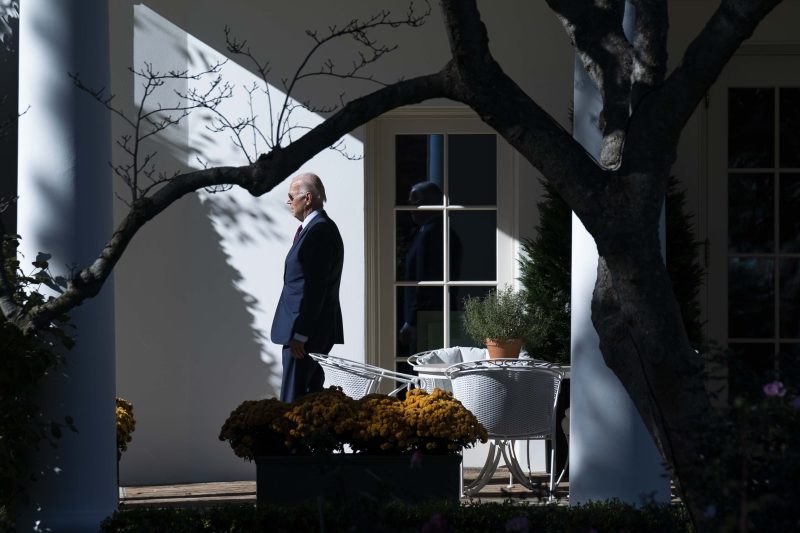Over the last full weekend of September, Hollywood titan Ari Emanuel — brother of former Chicago mayor and current Japan Ambassador Rahm Emanuel — co-hosted his annual, off-the-record power conference, gathering fellow luminaries of entertainment, finance, politics and technology in sun-dappled Aspen, Colo.
At one point, during a political panel that included Ron Klain, President Biden’s former chief of staff, an audience member worried aloud that the Democratic Party had a serious problem. Biden is too old and could lose the election, this person fretted, before asking the question that has been disquieting Democratic circles for more than a year: What is the backup plan?
Klain’s rebuttal was swift, recalled one attendee, who spoke on the condition of anonymity to share candid details of the private event. The president is the party’s nominee, Klain said, and a strong nominee at that. There is no backup plan. Several Democrats later approached Klain to thank him for his forceful defense of Biden, a second person familiar with the moment said.
Similar scenes have been playing out repeatedly since then, as Biden’s allies play whack-a-mole with the burbling anxiety — reflected in early polling — that Biden could lose in an increasingly likely 2024 rematch next year between two veterans of the Oval Office, Biden and Donald Trump.
Facing calls to become more active and aggressive, Biden and his team have responded with versions of Klain’s defiance. They have rejected the concerns in private briefings with donors and allies and have otherwise stayed the course on the mostly behind-the-scenes work of testing ads, organizing and outreach efforts that they will deploy at scale next year.
This portrait of Democratic anxiety — and the Biden campaign’s effort to contain the party’s crisis of confidence — is the result of 30 interviews with Democratic aides, strategists, Biden campaign officials and others, many of whom spoke on the condition of anonymity to share candid assessments on a sensitive topic.
The central concern is that Biden, who turns 81 on Monday, has lost a step and is showing visible signs of aging. He has struggled to sell his economic accomplishments. And there are worries that his campaign, so far devoid of major events or organizing efforts, is not doing enough to deal with the public hand-wringing over his chances or the coming threat of Trump, 77.
The unease is evident across the party: administration officials, elected officials, major donors — including those who have already given hundreds of thousands of dollars to Biden and his team — top strategists and campaign officials closely allied or working with the reelection effort.
The White House and the Biden campaign have largely dismissed the concerns as unjustified agita, reminiscent of the criticism Biden’s campaign faced in 2020 and former president Barack Obama’s reelection campaign underwent in the fall of 2011. They argue that the current polling does not capture the likely outcome of an election, which will only come into focus once voters engage next year with the possibility of another Trump term in the White House.
The debate has arrived amid a growing realization, less than a year out from the 2024 presidential election, that there may not be any other viable option for the Democratic nomination. Biden enjoys a nearly 60-point lead over his two major primary opponents, author Marianne Williamson and Rep. Dean Phillips (D-Minn.), and the logistics to even mount a viable primary opposition at this late date are daunting.
The last time an incumbent president declined to seek reelection was more than a half-century ago, when President Lyndon B. Johnson — amid the growing unpopularity of the Vietnam War — stunned the nation in 1968 by announcing he would not run for a second term. Even privately, Biden has showed no signs of stepping aside — and doing so now could unleash seismic consequences, making Democrats look divided at a time when unity is paramount.
“Joe Biden is not a perfect person — no such person exists — and he has strengths and weaknesses as a candidate, to be sure, but he will be the Democratic Party’s nominee,” said Dmitri Mehlhorn, a Democratic strategist and major fundraiser. “Joe Biden is going to be the nominee, and he is the best bet to beat Donald Trump, and people have to help us make that happen because the alternative is Donald Trump and is a catastrophe for American democracy.”
Some of Biden’s biggest donors, who have already given hundreds of thousands of dollars to his effort, have privately expressed a desire for a more open primary. Others fear Biden risks endangering both his legislative legacy and his status as the Trump slayer if he loses next year, people familiar with the conversations said.
The concerns are anchored in early survey data, which show Biden is weaker than he was four years ago. An October Fox News poll found 53 percent of Democratic primary voters would like to see the party nominate someone other than Biden. A 59 percent majority said they have an unfavorable view of Biden overall, up from 44 percent in the fall of 2019 and similar to the 56 percent who currently see Trump in an unfavorable light.
The unexpected Israel-Gaza war has magnified fissures in the Democratic Party domestically, and Biden is also grappling with other challenges, from the ongoing debate of how to handle Russia’s invasion of Ukraine to inflation.
Democrats close to the campaign are also growing increasingly alarmed about its strategy — or, more specifically, what they worry is the lack of one, according to conversations with multiple people briefed on the operation.
Some argue that neither Biden nor his team have effectively communicated a reelection plan, a second-term governing vision or a clear argument against Trump. In response, the Biden camp’s public message has begun to shift in recent days, with far more aggressive attacks on Trump’s record on opposing abortion rights and on his second-term plans for immigration, including a massive expansion of deportations and a legal challenge to birthright citizenship.
“How many times in 2020 did you hear the president say, ‘Don’t compare me to the almighty — compare me to the alternative,’” former Obama senior adviser David Axelrod said. “Well, if I were them, I’d say, ‘Let the comparison begin,’ and push it on the contrast in values and policies and results that work for them.”
Others have expressed concern at the campaign’s polling strategy, which they say has been too limited as staff focus on measuring the effectiveness and reach of the campaign’s early advertising. Democrats briefed on the campaign operation said there are unanswered questions that could help guide a strategy — including how to effectively communicate about Biden’s weaknesses, such as his age and the economy. Biden advisers counters that more polling is being done than their critics know about.
“The absence of polling explains stuff like ‘Bidenomics,’” said one national Democratic consultant, referring to Biden’s slogan for selling his economic policies at a time when voters remain deeply unhappy with his efforts in that area. “It’s just malpractice.”
Democrats have also expressed concern about the campaign’s thin operation in battleground states. Outside of pilot programs for organizing in Arizona and Wisconsin, the campaign has not built on the Democratic National Committee’s presence in key states or placed staff in any of the early primary states. That is expected to shift in the coming weeks, as the campaign moves to appoint state directors for the early primary state of South Carolina and at least two other states by the end of the year.
Ultimately, though, many worried donors say they have no plans to take their concerns public or change course. Some are enticed by Phillips, who is the lone elected Democrat challenging Biden, but view his bid as a long-shot protest campaign rather than a true alternative. Others remain confident in the senior team around Biden, most of whom continue to work in the White House and have weathered many similar waves of public grousing in previous campaigns.
“The bad news is that everybody is wetting the bed inside of Biden world,” said one fundraiser. “It’s really an unhappy confluence of Biden world donors’ cocktail party friends saying ‘Can’t you get him not to run,’ which is stupid and absurd if you know Joe Biden.”
Inside the White House, the donor freakout has largely prompted eye rolls from senior staff. In private conversations, top aides to the president have not second guessed their strategy and have brushed off the criticism as another round of Democrats underestimating Biden. But others helping the campaign privately acknowledge the need to more directly head off the impression — particularly among donors — that the campaign lacks a clear strategy or the ability to execute it, prompting new outreach to stakeholders.
Other Biden allies also stress that Democratic panic is not universal. At donor meetings in Washington recently for Unite the Country, a pro-Biden super PAC, officials said there was no second guessing Biden.
“No one asked if he’s going to run,” said Amanda Loveday, a senior adviser to Unite the Country. “No one asked, ‘Can he do it?’ No one asked, ‘Can he win?’ It was 100 percent behind the guy. He’s the only option to beat Trump, and having Trump is not an option.”
Just six weeks after the confab in Aspen, Biden campaign officials — including senior adviser Becca Siegel and chief analytics officer Meg Schwenzfeier — delivered a presentation at the Obama Foundation democracy forum in Chicago to address the same alarm.
Several thousand former Obama staffers were gathering in Chicago on the first weekend of November for the event pegged to the 15th anniversary of his 2008 victory, and Biden allies realized the president had a serious problem: Many Democrats were increasingly unhappy over Biden being their standard-bearer, and the campaign needed to reassure the party faithful of his path to victory.
The pitch was effective in calming nerves, according to several people familiar with the presentation, as it ran through the broader electoral trends in six key swing states, which have all moved toward Democrats since 2022.
The campaign aides also ran through the reasons they believe that current polling cannot predict an outcome next year — because so many voters are currently tuned out and do not yet view the race as a stark choice between Trump and Biden. At the end of the presentation, they emphasized how close they expect the 2024 election to be, noting that if 45,000 people had voted differently in key states in 2020, Trump would still be president.
That same weekend, the New York Times and Siena College released a set of polls showing Biden trailing Trump in five of six key battleground states, amid voter concerns about Biden’s age and his handling of the economy.
Axelrod, a key architect of Obama’s presidential campaigns, took to X, previously Twitter, to worry aloud about his party’s likely nominee. In his posts, Axelrod described the polls as a “legitimate concern”; noted that Biden’s age is “his biggest liability” and “the one thing he can’t change”; and concluded by asking “whether it’s in HIS best interest or the country’s” for Biden to continue to run for reelection.
“The real Plan B should be that the whole party should be thrust into a comparative process,” he said in an interview a few days after his posts on X. “We’re at a kind of inflection point. It’s good to take stock of where this is at. It’s good to have these discussions.”
At the Chicago forum, multiple attendees also noted the pointed absence of any meaningful cheerleading for Biden, who had served eight years as Obama’s vice president. Obama barely mentioned Biden in the speech he delivered that Friday night, and in an interview with the Pod Save America podcast the same day, Obama eschewed several opportunities to promote his former running mate’s campaign.
An Obama spokesperson said the reunion was hosted by the Obama Foundation, a nonprofit that cannot legally engage in partisan political activity, and pointed to the Biden campaign’s off-site briefing, which drew a standing-room-only crowd.
Yet several attendees said the tensions were evident.
“The takeaway of the weekend was not, ‘Hey team, we’re got to get the band back together to help Biden out,’” said one, speaking on the condition of anonymity to share a candid assessment. “If this a supposedly existential threat and democracy is so challenged, then why aren’t you being more overt about it.”
The following Tuesday, Democrats made impressive gains in another off-year election — helping to quiet some of the Biden Plan B chatter, at least temporarily.
Democrats held the governorship in reliably Republican Kentucky, and seized control of the Virginia legislature, despite high profile efforts by Gov. Glenn Youngkin (R) to boost Republican numbers. In Ohio, Democrats also lifted ballot initiatives supporting abortion rights and marijuana legalization.
“We have heard the press and pundits count Joe Biden out time and time again, but we know that he always proves them wrong,” Biden campaign manager Julie Chavez Rodriguez said afterward. “If we want a real window into where voters actually are, we know the best way to measure that is to see how they are actually voting.”
Scott Mulhauser, a Democratic strategist who worked in both the Biden and Obama administrations, said the election “relegates an internecine party squabble to a blip, and makes it clear that polls don’t vote — people do.”
Phillips, however, said Biden and his team are taking the wrong message away from the recent elections. He has vowed to fight on for the nomination, starting in New Hampshire, where the primary is unsanctioned by the Democratic Party and Biden supporters must write in the president’s name to vote for him.
“The Democratic brand isn’t the problem,” Phillips said in an interview. “It’s becoming clear that President Biden is the problem.”
There is another problem for Democrats looking for a Biden alternative: the reality that, less than a year from Election Day, there is no feasible backup option.
Multiple Democrats privately say they believe Vice President Harris would prove similarly weak — if not weaker — than Biden as a general election candidate, and other would-be Democratic candidates are also losing to Trump in current head-to-head polls. But, they add, even if Biden were to stand down, they see no way of also pushing aside his No. 2 — a historic first Black, Indian American and female vice president — without alienating huge swaths of the Democratic base.
Meanwhile, the electoral calendar and its filing deadlines prove yet another hurdle, making it challenging for any would-be candidate to get on the ballot in all 50 states.
The deadlines to qualify for the presidential primary ballot in states like Alabama, Arkansas, Michigan, Nevada and South Carolina have already passed, meaning any late entrant will have already lost the opportunity to win delegates in those states.
The difficulty of meeting each state’s requirements varies and the hurdles often involve complex signature-gathering efforts that take time, resources and a well-trained staff.
“It’s a very practical problem that people are beginning to face right now,” said Elaine Kamarck, a senior fellow at the Brookings Institution, as she ticked off more than a dozen ballot deadlines coming up in late November and early January.
And even if the next generation of Democrats could scramble to mount a plausible bid, there are no guarantees such an effort would be seamless — or victorious.
“A lot of people come and they wish-cast, like imagine Gretchen Whitmer and imagine Raphael Warnock going up on the same ticket,” Mehlhorn said, referring to the Democratic governor of Michigan and the Democratic junior senator from Georgia, respectively. “And it’s like, yeah, I could spin that, I watched ‘The West Wing,’ but there are a lot of steps to get there.”
Scott Clement, Amy Gardner and Maeve Reston contributed to this report.



























